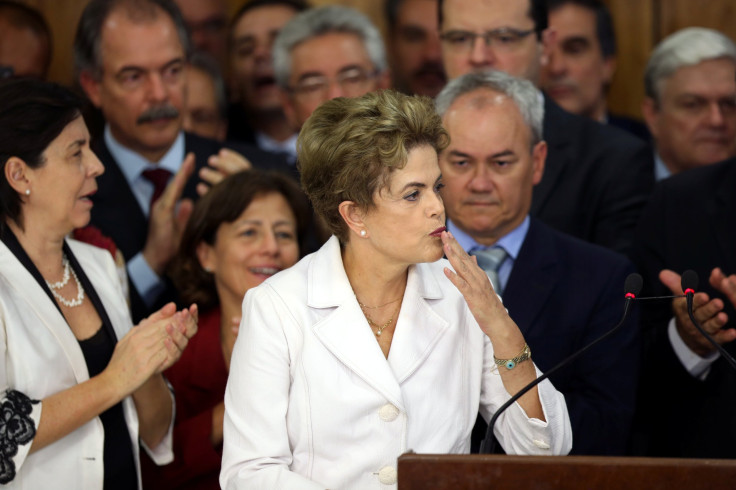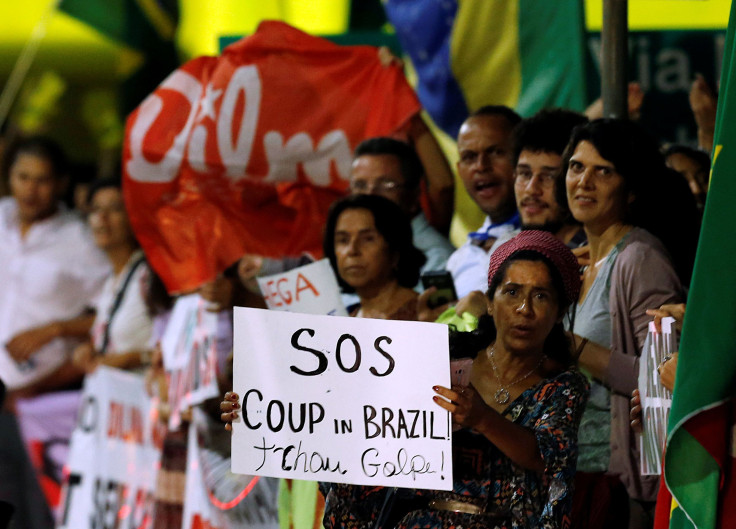Brazil Impeachment Crisis: Vice President Michel Temer Steps In After Senate Votes To Suspend President Dilma Rousseff

Brazilians awoke Thursday morning to a new interim president after the country’s political crisis took another dramatic turn following months of wide-ranging corruption allegations and legal maneuvers. The country’s Senate voted early Thursday to suspend President Dilma Rousseff, effectively removing her from office for up to six months ahead of a trial to determine whether she broke government budgetary rules.
Vice President Michel Temer now takes the reins of a nation mired in economic turmoil less than 100 days before the spotlight turns directly on the Olympic Games, which kick off in August in Rio de Janeiro. Known as a business-friendly politician, his appointment could bring a short-term return in investor confidence, but Rousseff’s shadow will loom over the country for as long as six months as a trial over allegations against her unfolds. Temer comes into the role without a completely clean slate, having been accused of corruption in relation to the kickback scandal at state oil company Petrobras.
“Overall this is a process of several months, if not several years, of the government mismanaging the economy on the one hand and the rules of the political game in Brazil on the other,” said João Augusto de Castro Neves, a Brazil specialist and the director for Latin America at the Eurasia Group, a political risk consulting firm. “It’s a traumatic process that Brazil is going through, but I would interpret it more as dysfunctional rather than illegitimate and the growing pains of a democracy that’s getting more mature over time.”
Fifty-five of 81 senators (of which only 77 voted) in Latin America’s largest economy voted in favor of the suspension that is also being viewed as a referendum on Rousseff’s presidency. Her suspension could last as long as six months while a trial dives into allegations that she borrowed money from state institutions to hide the country’s growing deficit ahead of the 2014 presidential election.
Brazil’s first female president, who has been in office since 2011, has vigorously denied any wrongdoing and vowed to fight the charges against her. The majority of Brazilians, whose faith in the political establishment has been shaken, want to see the second-term president impeached as they eye another corruption probe of political elites over kickbacks at Petrobras.
If the trial against Rousseff succeeds with a two-thirds vote in the Senate, she would become the first president impeached and removed from office in Brazil. Former President Fernando Collor de Mello resigned in 1992 when faced with impeachment over corruption charges related to campaign finance. He was found guilty after stepping down and prevented from running for office for eight years.

If Rousseff is ousted, Temer would serve as president for the remainder of her term before the next presidential election, scheduled for 2018. Should Temer face further complications over Petrobras, Brazil’s line of presidential succession would move to the speaker of the lower house followed by the leader of the upper house, both of whom also face criminal probes.
Viewed as an emerging economic powerhouse in the early 2000s, Brazil is suffering from its second year of recession, with unemployment rising from 7.4 percent in 2015 to 10.2 percent this year. Temer’s new role is anticipated to bring a positive market reaction with the expectation that he will work to cut the country’s deficit.
“I do expect a reversal in sentiment with some confidence to come back and markets to react very positively, and that could of course bring in some much-needed external money into the country, but I don’t really see companies in Brazil right now with the ability to invest,” said Monica de Bolle, a nonresident senior fellow who specializes in Brazil’s economy at the Peterson Institute for International Economics in Washington. “So the whole investment growth story is going to take a while to materialize.”
However, the long-term political operative Temer has been named by witnesses in the Petrobras corruption case and could end up under investigation despite already denying any wrongdoing. Like Rousseff, his popularity remains low among Brazilians.
Temer will likely announce a new cabinet as soon as Thursday. Local media have mentioned former central bank head Henrique Meirelles to potentially become finance minister and the head of Itaú Unibanco, Ilan Goldfajn, to lead the central bank. The appointment of already established officials could help decrease the economic uncertainty.
While a slight honeymoon period might take place, large-scale macroeconomic reforms in areas including the pension and labor sectors are unlikely to take place in an interim government.
“There’s not going to be a paradigm shift,” Castro Neves of the Eurasia Group said. “Don’t hold your breath to see Brazil being the darling of the markets again in the next six to 12 months. It’s going to be a very slow process.”
Temer could focus on microeconomic reforms that do not require congressional approval, such as working on easing regulations for doing business in Brazil. The country is currently ranked 174 out of 189 economies for how easy it is to start a business, according to the World Bank’s latest report on global business.
With the Olympics scheduled to begin Aug. 5, it is possible the Brazilian Senate will not spend 180 days examining the case against Rousseff and instead expedite the process to avoid magnifying the already intense international scrutiny of the country.
“The Brazilian population as a whole, it’s as if the Olympics weren’t happening in less than three months, no one is focused on that,” de Bolle said. “I do expect the Olympics to go down quite smoothly. One thing that is very much in Brazilian culture is this sense of you put aside your problems, you throw a party and then go back to them the next day. That’s how Carnival works every year.”
While it remains unclear which Brazilian leader will welcome the world to the Summer Games, experts caution that more twists and turns along the way are likely. Rudi Rocha, a professor of economics at the Institute of Economics at the Federal University of Rio de Janeiro, thinks the short-term economic uncertainty will decrease, but said the situation is far from over.
“We are still waiting for the next chapter of the novel,” Rocha said. “Every week something happens. We still don’t have the answers on how the interaction between the Supreme Court, the Congress and the executives is going to happen. The political side is very uncertain.”
© Copyright IBTimes 2025. All rights reserved.






















